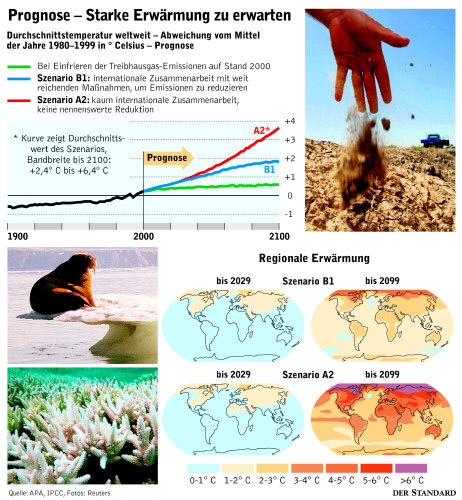|
IPCC Fourth Assessment Report
“Climate Change 2007: The Physical Science Basis”,
assesses the current scientific knowledge of the natural and human
drivers of climate change, observed changes in climate, the ability
of science to attribute changes to different causes, and projections
for future climate change.
The report was produced by some 600 authors from 40
countries. Over 620 expert reviewers and a large number of government
reviewers also participated. Representatives from 113 governments
reviewed and revised the Summary line-by-line during the course
of this week before adopting it and accepting the underlying report.
| Downloads
| International Press |

Downloads:
IPCC
Fourth Assessment Report, Working Group III Report "Mitigation
of Climate Change"
Full report now available online (pre-copy edit version)
31.05.07, © IPCC
IPCC
Fourth Assessment Report, Working Group III, "Mitigation of
Climate Change"
Summary for Policymaker
The Working Group III contribution to the IPCC
Fourth Assessment Report (AR4) focuses on new literature on the
scientific, technological, environmental, economic and social aspects
of mitigation of climate change, published since the IPCC Third
Assessment Report (TAR) and the Special Reports on CO2 Capture and
Storage (SRCCS) and on Safeguarding the Ozone Layer and the Global
Climate System (SROC).
04.05.07, © IPCC
IPCC
Fourth Assessment Report, Working Group II Report "Impacts,
Adaptation and Vulnerability"
Summary for Policymakers
This Summary sets out the key policy-relevant
findings of the Fourth Assessment of Working Group
II of the Intergovernmental Panel on Climate Change (IPCC).
The Assessment is of current scientific understanding of impacts
of climate change on natural, managed and human systems, the capacity
of these systems to adapt and their vulnerability1. It builds upon
past IPCC assessments and incorporates new knowledge gained since
the Third Assessment.
© IPCC
IPCC
Fourth Assessment Report,Working Group I Report "The Physical
Science Basis",
Full report
© IPCC
IPCC Report:
Climate Change 2007, Working Group I Report: "The Physical
Science Basis"
Summary for Policymakers
© IPCC
Highlights
from "Climate Change 2007: The Physical Science Basis - Summary
for Policy Makers"
Pew Center's Summary of the Report
© Pew Center
Summary
of the 10th Session of Working Group I of the Intergovernmental
Panel on Climate Change: 29 January - 1 February 2007
© Earth Negotiations Bulletin, IISD
Fotostrecke:
Karten der Klimazukunft
© Der Spiegel
Grafik: Starke Erwärmung zu erwarten
Durchschnittstemperatur weltweit - Abweichung
vom Mittel der Jahre 1980 - 1999 in Grad Celsius - Prognose
© Der Standard

TOP

International Press:
Bush
accepts science on warming
The White House yesterday embraced a new international
report faulting humans for global warming, marking the furthest
President Bush has gone in placing blame.
But administration officials again rejected the Kyoto-style caps
on carbon emissions that have been the preferred solution of European
nations.
The report, released in Paris by the U.N. Intergovernmental Panel
on Climate Change, said the fact that the Earth is now warming "is
unequivocal," and said it is "very likely" that human
activity is responsible for many of the changes.
03.02.07, © The Washington Times
2500
scientists, 1200 pages, and one quibble
After years of research and a marathon week of
intense secret debate, scientists from around the world last night
signed off on a bleak assessment of a devastated planet: Earth.
A turbulent future of violent storms, devastating drought, increasing
temperatures and rising sea levels is inevitable, according to a
United Nations report released in Paris last night. The report,
the work of 2500 scientists over six years, is considered the most
authoritative evaluation of climate change ever produced.
03.02.07, © the Age.com.au
Fossil
fuel and land use behind CO2 rise
The first volume of the fourth assessment report
by the Intergovernmental Panel on Climate Change (IPCC) has been
almost three years in the writing and brings together the work of
600 writers from 40 countries. More than 620 experts have reviewed
the findings, and representatives of 113 governments have read and
revised the key points.
The report assesses our current knowledge of climate change and
the reasons behind it, looks at how the climate has already changed
and how a range of different scenarios may have an impact in the
future.
02.02.07, © The Guardian Unlimited
UNO-Klimabericht:
Temperaturanstieg "beispiellos"
Bis zum Ende des Jahrhunderts droht der Erde eine
"beispiellose" Klimaerwärmung um bis zu 6,4 Grad
Celsius. Davor warnt der UNO-Klimarat IPCC in seinem vierten, am
Freitag in Paris vorgestellten Bericht.
02.02.07, © ORF Science
US-Regierung
lehnt nach UNO-Klimabericht einseitige Maßnahmen ab
Die US-Regierung hat sich in einer Reaktion
auf den neuen UNO-Bericht über die Erderwärmung gegen
einseitige Maßnahmen zur Bekämpfung des Klimawandels
ausgesprochen. Der US-Anteil am Ausstoß von Treibhausgasen
sei nur "gering, wenn man sich den Rest der Welt ansieht",
sagte US-Energieminister Sam Bodman am Freitag.
03.02.07, © Der Standard
TOP

|






